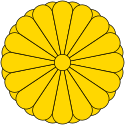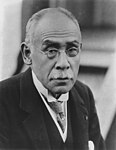1924 Japanese general election
Appearance
| |||||||||||||||||||||||||||||||||||||||||||||||||||||||||||||||||
All 464 seats in the House of Representatives 233 seats needed for a majority | |||||||||||||||||||||||||||||||||||||||||||||||||||||||||||||||||
|---|---|---|---|---|---|---|---|---|---|---|---|---|---|---|---|---|---|---|---|---|---|---|---|---|---|---|---|---|---|---|---|---|---|---|---|---|---|---|---|---|---|---|---|---|---|---|---|---|---|---|---|---|---|---|---|---|---|---|---|---|---|---|---|---|---|
| |||||||||||||||||||||||||||||||||||||||||||||||||||||||||||||||||
| |||||||||||||||||||||||||||||||||||||||||||||||||||||||||||||||||
| This article is part of a series on |
 |
|---|
|
|
General elections were held in Japan on 10 May 1924.[1] No party won a majority of seats, resulting in Kenseikai, Rikken Seiyūkai and the Kakushin Club forming the country's first coalition government led by Katō Takaaki.
Electoral system
[edit]The 464 members of the House of Representatives were elected in 295 single-member constituencies, 68 two-member constituencies and 11 three-member constituencies. Voting was restricted to men aged over 25 who paid at least 3 yen a year in direct taxation.[2]
Campaign
[edit]A total of 972 candidates contested the elections, of which 265 were from Kenseikai, 242 from Seiyūhontō, 218 from Rikken Seiyūkai, 53 from the Kakushin Club and 194 from minor parties or running as independents.
Results
[edit] | |||||
|---|---|---|---|---|---|
| Party | Votes | % | Seats | +/– | |
| Kenseikai | 872,533 | 29.35 | 151 | +41 | |
| Seiyūhontō | 730,077 | 24.56 | 111 | New | |
| Rikken Seiyūkai | 666,317 | 22.41 | 103 | –175 | |
| Kakushintō | 182,720 | 6.15 | 30 | New | |
| Others | 521,311 | 17.54 | 69 | +22 | |
| Total | 2,972,958 | 100.00 | 464 | 0 | |
| Valid votes | 2,972,958 | 99.16 | |||
| Invalid/blank votes | 25,310 | 0.84 | |||
| Total votes | 2,998,268 | 100.00 | |||
| Registered voters/turnout | 3,288,405 | 91.18 | |||
| Source: Mackie & Rose, Voice Japan | |||||




